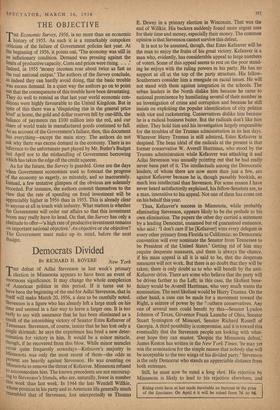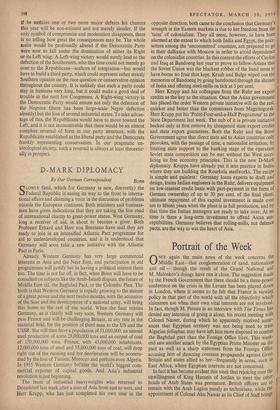Democrats Divided
By RICHARD H. ROVERE New York THE defeat of Adlai Stevenson in last week's primary election in Minnesota appears to have been an event of enormous significance. It may change the whole complexion of American politics in this period. If it turns out to have been the beginning of the end for Adlai Stevenson, that in itself will make March 20, 1956, a date to be carefully noted. Stevenson is a figure who has already left a large mark on his time and seemed in a fair way to leave a larger one. It is too early to say with assurance that he has been eliminated as a result of the astonishing victory of Senator Estes Kefauver of Tennessee. Stevenson, of course, insists that he has lost only a single skirmish; he says the experience has bred a new deter- mination for victory in him. It would be a minor miracle, though, if he recovered from this blow. While minor miracles occur quite frequently nowadays—Kefauver's majority in Minnesota was only the most recent of them—the odds at Present are heavily against Stevenson. He was counting on Minnesota to remove the threat of Kefauver. Minnesota refused to accommodate him. The known precedents are not encourag- ing to Stevenson's friends, who arc, naturally, fewer in number this week than last week. In 1944 the late Wendell Willkie. Whose position in his party and in American life generally much resembled that of Stevenson, lost unexpectedly to Thomas E. Dewey in a primary election in Wisconsin. That was the end of Willkie. His backers suddenly found more urgent uses for their time and money, especially their money. The common opinion is that Stevenson cannot survive this defeat.
It is not to be assumed, though, that Estes Kefauver will be the man to enjoy the fruits of his great victory. Kefauver is a man who, evidently, has considerable appeal to large numbers of voters. Some of this appeal seems to rest on the poor stand- ing he enjoys with the ruling powers in his party. He has no support at all at the top of the party structure. His fellow- Southerners consider him a renegade on racial issues. He will not stand with them against integration in the schools. The urban leaders in the North dislike him because he came to national prominence by humiliating several of their number in an investigation of crime and corruption and because he still insists on exploiting the popular identification of city politics with vice and racketeering. Conservatives dislike him because be is a radical business baiter. But the radicals don't like him either. They hold him and his investigation largely responsible for the troubles of the Truman administration in its last days. Wherever Harry Truman is still admired. Estes Kefauver is despised. The beau ideal of the radicals at the present is that former conservative W. Averell Harriman, who stood by the Truman administration while Kefauver was attacking it and Adlai Stevenson was uneasily pointing out that he had really never been part of it. The intellectuals among the Democratic leaders, of whom there are now more than just a few, are against Kefauver because he is. though passably bookish, so much less intellectual than Stevenson. For some reason 1 have never heard satisfactorily explained, his fellow-Senators are, to a man, insensitive to his appeal. Not one of them has come out on his behalf this year.
Thus. Kefauver's success in Minnesota. while probably eliminating Stevenson, appears likely to be the prelude to his own elimination. The papers the other day carried a statement by a leading Democrat, unnamed but of guaranteed eminence, who said : `I don't care if he [Kefauver] wins every delegate in every other primary from Florida to California; no Democratic convention will ever nominate the Senator from Tennessee to be President of the United States.' Getting rid of him may require desperate measures, and there is always the chance, if his mass appeal is all it is said to be, that the desperate measures will not work. But there is no doubt that they will be taken; there is only doubt as to who will benefit by the anti- Kefauver drive. There are some who believe that the party will be driven farther to the Left; in this case, the likeliest bene- ficiary would be Averell Harriman, who very much wants the nomination. The next likeliest would be Harry Truman. On the other hand, a case can be made for a movement toward the Right, a seizure of power by the c'euthern conservatives. Any one of several men could benefit by this—Senator Lyndon Johnson of Texas, Governor Frank Lausche of Ohio, Senator Stuart Symington of Missouri, Senator Richard Russell of Georgia. A third possibility is compromise, and it is toward this eventuality that the Stevenson people are looking with what- ever hope they can muster. `Despite the Minnesota defeat,' James Reston has written in the New York Times, `he may yet win the nomination for the simple reason that nobody else will be acceptable to the two wings of his divided party.' Stevenson is the only Democrat who stands an appreciable distance from both extremes.
Still, he must now be rated a long shot. His rejection by Minnesota is likely to lead to his rejection elsewhere, and if he sustains one or two more major defeats his chances this year will be non-existent and not merely slender. If the only symbol of compromise and moderation disappears, there is no telling how great the consequences may be. The whole scene would be profoundly altered if the Democratic Party were now to fall under the domination of either its Right or its Left wing. A Left-wing victory would surely lead to the defection of the Southerners, who this time could not merely go over to the Republicans—authors of integration—but would have to build a third party, which could represent either strictly Southern opinion on the race question or conservative opinion throughout the country. It is unlikely that such a party could stay in business very long, but it could make a good deal of trouble in the next few Congresses. A Right-wing victory in the Democratic Party would ensure not only the defection of the Negroes (there has been large-scale Negro defection already) but the loss of several industrial states. To take advan- tage of this, the Republicans would have to move toward the Left, and it is not inconceivable that there would be an almost complete reversal of form in our party structure, with the Republicans established as the liberal party and the Democrats frankly representing conservatism. In our pragmatic un- ideological society, such a reversal is always at least theoretic- ally in prospect.



































 Previous page
Previous page